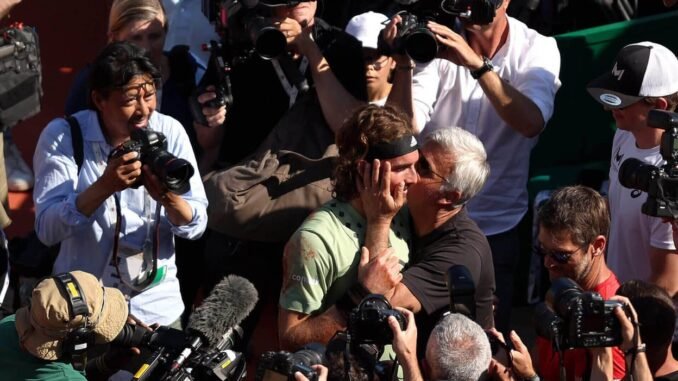
Fathers, Sons, and Courtside Bonds: How Stefanos and Apostolos Tsitsipas Redefine Tennis Coaching—and Who Else is Changing the Game…Read More…
In the fiercely competitive world of professional tennis, the player’s box often becomes more than a quiet seat for spectators. It’s a nerve center of emotion, strategy, and family ties. No relationship illustrates this dynamic more vividly than the one between Stefanos Tsitsipas and his father-coach, Apostolos Tsitsipas. Their story is not just about athletic excellence but also about the intense complexities of familial coaching—how it can forge greatness, strain personal bonds, and inspire a new generation of tennis parenting.
Stefanos and Apostolos: A Courtside Odyssey
Stefanos Tsitsipas, the charismatic Greek star, burst onto the global tennis scene with a blend of classical style and modern athleticism. From his earliest days on the court, his father Apostolos has been the ever-present figure by his side—coach, mentor, protector, and sometimes even critic. Their journey is a textbook example of how coaching within the family can be both a blessing and a burden.
Apostolos, who holds a degree in sports science and once competed in tennis himself, made a critical decision early on: to devote his life to nurturing Stefanos’s talent. He quit his job to coach his son full-time and helped engineer a developmental path that would eventually lead Stefanos into the ATP Top 10 by the age of 21.
Yet, the ride has not always been smooth. Their courtside disagreements have made headlines—most notably during the 2022 ATP Cup and the Australian Open, where animated exchanges drew attention from commentators and fans alike. Critics questioned whether Apostolos’s passionate involvement was helping or hindering his son’s career. Stefanos himself once admitted that “sometimes it gets too intense,” but insisted he respects and loves his father too much to shut him out.
Their bond is complicated, but ultimately powerful. Apostolos has stood by his son through wins and heartbreaks, most notably during Stefanos’s dramatic five-set loss to Novak Djokovic in the 2021 French Open final. In moments like that, the father’s voice is often the only one that matters—reassuring, firm, and deeply invested.
The Perks and Pitfalls of Paternal Coaching
The Tsitsipas duo represents a growing trend in tennis: parent-coaches shaping their children’s professional careers from day one. The advantages are obvious—trust, emotional closeness, and a unique understanding of the player’s needs. But the pitfalls are just as real. Emotional boundaries can blur. Constructive criticism can feel personal. And external pressures can ignite internal tensions.
This tightrope has been walked before—sometimes to spectacular success.
The Nadal Blueprint: Uncle Toni’s Influence
No conversation about family coaching in tennis is complete without mentioning Rafael Nadal and his uncle Toni. For over a decade, Uncle Toni was Rafa’s only coach, instilling discipline, humility, and a ferocious work ethic. His belief in making Rafa “suffer in practice to triumph in matches” became legendary. Their split in 2017 was amicable and came only after Rafa had solidified his legacy with multiple Grand Slam titles. Even after stepping down, Toni remains a vital influence in Rafa’s life and career.
What made the Nadal partnership work was clarity: Toni was always more than an uncle—he was a mentor with a singular focus on Rafa’s long-term growth, both as a player and a person. Their story showed that familial coaching can succeed when it respects boundaries and evolves with time.
Djokovic’s Family Circle
Novak Djokovic, too, has had his father, Srdjan, play a significant role in shaping his career, though not in the formal capacity of coach. Srdjan’s fierce belief in his son’s destiny often made headlines—sometimes controversially—but his emotional support remained unshaken. Djokovic’s rise was aided more by coaches like Marian Vajda, but his family’s psychological influence cannot be underestimated.
The Williams Sisters: The Ultimate Tennis Parenting Story
Of course, no tennis family narrative is as iconic as that of Richard Williams and his daughters, Venus and Serena. Long before they hit their first serves on the WTA tour, Richard envisioned his daughters becoming champions. He coached them on broken courts in Compton and turned their lives into a mission. His methods were unorthodox and often criticized, but history proved him right. Both Serena and Venus became world No. 1, Grand Slam winners, and cultural icons.
Unlike many others, Richard Williams knew when to step back, allowing professional coaches to take the reins when necessary. That balance between father and coach ultimately helped sustain their success over two decades.
The Future of Father-Son Coaching
As tennis continues to evolve, so does the idea of coaching. Advanced analytics, sports psychology, and biomechanics are becoming central to player development. But the human element—the passion of a parent, the trust of a child—is still irreplaceable.
Stefanos and Apostolos Tsitsipas exemplify this old-school connection in a new-era game. They may argue, disagree, and face scrutiny from media and fans, but their shared journey is rooted in loyalty and ambition. Stefanos once said, “Without my father, I wouldn’t be here.” It’s a sentiment echoed by many players who’ve dared to walk this challenging path with a parent.
As tennis enters a new generation, the model of the coaching father—or mother—is likely to remain, though with better boundaries and professional support systems. After all, who better to believe in your greatness than the one who’s watched you grow from your very first swing?
In the end, the courtside bond between father and son may be the greatest rally of them all—built not just on backhands and strategy, but on love, sacrifice, and unshakable belief.
Leave a Reply